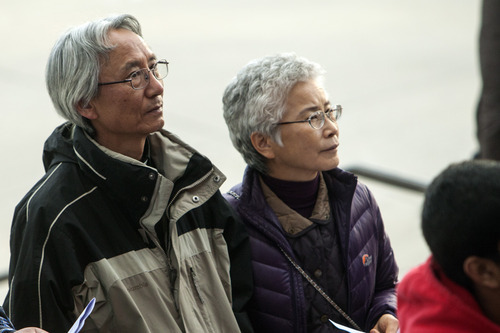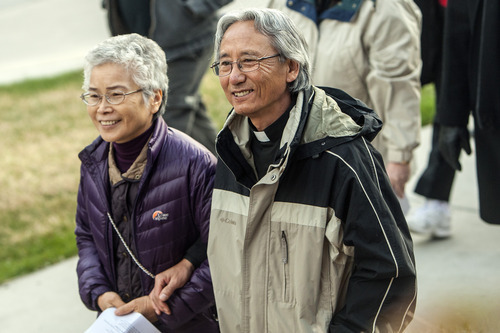This is an archived article that was published on sltrib.com in 2012, and information in the article may be outdated. It is provided only for personal research purposes and may not be reprinted.
Last October, Eun-sang Lee and Yvonne Lee knew instantly the exquisite agony of anyone who gets this late-night message: Your son is dead.
But the Lees are not just parents of a murdered child. They are pastors at separate Protestant churches in Utah who today will offer their first Easter sermons since seeing their son's lifeless body at a Korean airport.
On this day, Christians worldwide revisit the biblical story of women going to wash and clean Jesus' bruised and battered body as a final gesture of love only to find the tomb empty. Instead, so the story goes, Mary Magdalene and others find their Lord alive. Resurrected.
The Lees will mourn with the millions who have lost loved ones and celebrate with many millions more who embrace the church's hopeful good news. They will sing their hallelujahs and, with joyful hearts, add the refrain — Christ is risen.
But the music in their soul has a different melody these days, with many more tones, harmonies, crescendoes, even silences than it had before that fateful call.
—
A father's quest • A third-generation Christian in his South Korean home, Eun-sang Lee was reared in a Holiness Church founded by Americans. But he was always a seeker.
"By the time I got to college in South Korea, I had lots of questions," Eun-sang says. "The church stopped making sense. It didn't explain my life experience."
Still, throughout his childhood, he had experienced what he called, "God moments," which he describes as "that unmistakable sense of the divine and that I was loved."
As he explored the spiritual, those moments stuck.
Then Eun-sang met a beautiful nurse-in-training, Yvonne.
She grew up in a Buddhist family but converted to Christianity in college. They were married in a Protestant church, then, in 1976, she moved to Denver. He followed two years later.
Eun-sang Lee became, he says, a typical immigrant.
Though a college graduate, his first job was as a dishwasher at Holiday Inn. He also waited and bused tables. At one point, he held two full-time jobs — working on a factory assembly line by day and cleaning offices at night.
Eventually, Eun-sang's questions led him to enroll at the Iliff School of Theology, a United Methodist seminary in Denver. He earned a master's degree and ultimately settled on a career as a pastor.
"I never had an ah-ha moment when I felt called to the ministry," he explains. "I simply felt ministry made sense for me. My desire was to lead a life that's meaningful. I wanted to model my life after Christ, to love those whom Jesus loved and make a difference in their lives and in the world."
Yvonne Lee followed him into the seminary, stayed longer and earned a doctorate.
Then came their two sons — first Gershom, or "Gery," then Samuel, or "Sammy."
—
A boy's path • Sammy Lee was a high-energy kid who multitasked with ease. After completing high school in Denver, he enrolled at St. Olaf College in Northfield, Minn., where he earned a degree in music and Asian studies.
After his graduation in the spring of 2005, Sammy suddenly began to weep and said, "I'm afraid."
Uncertainty about the future, Eun-sang suggests, "crushed upon him."
By the fall, though, Sammy was determined. He was going to Korea to teach English and study Asian musicology. He hoped to bring the music to the United States and introduce Americans to it. It was, his father recalls, "a grand dream" — but not so easy to accomplish.
Ultimately, Sammy joined a global education company known as Pearson Education, which is headquartered in London with branches in 75 countries. Soon, the young Lee was crisscrossing Asia — China, Japan, Singapore, Thailand. He earned a master's degree from a Korean college in foreign-language education. In January 2011, he married. He relished his life and loved sharing the adventures with his parents, who by now had been reassigned to Utah — his father to First United Methodist in Salt Lake City, his mother to Centenary United Methodist in Holladay.
Then came Sammy's routine trip to Indonesia.
He arrived at the airport late at night and took a cab to his hotel. While on the way, two men on motorcycles mugged him. They stabbed his thighs, robbed him and rode away.
At age 28, Sammy Lee bled to death under the dark sky, among strangers, far from home.
—
A mother's love • Yvonne can imagine how Jesus' mother felt, watching him on the cross.
"My understanding was that the cross wasn't very high from the ground," the pastor says. "His chest was at eye level, where anybody from the ground could reach him. I can imagine she was touching his flesh when he was dying."
Sammy's mother regrets that she did not have the chance to comfort or caress her son in his last moments.
"Not being able to touch him and hold his hands, tell him goodbye or pray for him," Yvonne says, her voice catching. "The way he died, it's really hard."
After the Lees heard the news, there came a flurry of decisions and negotiations.
The U.S. Embassy wanted to ship the body out of Indonesia as soon as possible, but the price tag for preparing the body and the coffin was nearly $20,000, an amount beyond the reach of Christian pastors. Fortunately, Sammy Lee's employer stepped in to help with those arrangements.
The parents saw their son for the last time at the Seoul airport, where the coffin had been sent. They were asked to identify their boy's body. It hardly resembled the lively, engaging son they knew.
The women's sojourn at the tomb, which is the scriptural text most Christians read on Easter, Eun-sang says, "certainly hit me when we received Sam's body."
It might not have been much different, he says, than the Lees' experience.
"This whole thing — Christ's death and pain — is not a theological proposition," he says. "It's real death, real suffering."
And it was no coincidence that women were there for Christ's body.
"Jesus' whole life," he says, "was about touching, kissing, eating. The reality of God's presence is so palpable."
Yvonne wonders how Jesus' mother did it.
"She had a lot of courage, but she probably wondered if [his death on the cross] was the only way," the grieving mother says. "Jesus was part of her flesh, the way my son was part of mine."
The Lees had Sammy's body cremated.
Then they returned to Seoul and Denver to celebrate his life with those who loved him.
—
A new kind of faith • For Yvonne, there is peace in trusting that God was there with her son as he died.
"God walked with him, whether it was an hour or half an hour, from the time he was stabbed until his heart stopped," she says. "During that physical suffering, I believe that God was holding him as I would do, that God has feminine characteristics as well as male."
Both parents feel a gaping hole in their chests, an ache and a longing for their son that won't go away. It's theirs.
"Somehow my flesh is living his life," Yvonne says. "Whenever I feel low energy, Sammy's spirit comes to me, and I just get up and do things. That's how I live his life in the sphere of resurrection; it's in my heart and my life."
Yvonne believes her faith in God's grace and mercy will carry her through.
"This Easter I will be encouraging people to meet Jesus in their hearts and souls, without that physical resurrection that may or may not happen," she says, "I leave it up to God, but with one question: Why couldn't God resurrect my son right now?"
Eun-sang, too, has a message for his diverse congregation of believers from 25 countries, as well as homegrown homeless, gays, lesbians — seekers of all kinds.
Resurrection is not about where we go after we die, he says. It's about how we live a Christ-like life full of meaning and compassion — here and now.
Twitter: @religiongal
Facebook.com/religiongal





